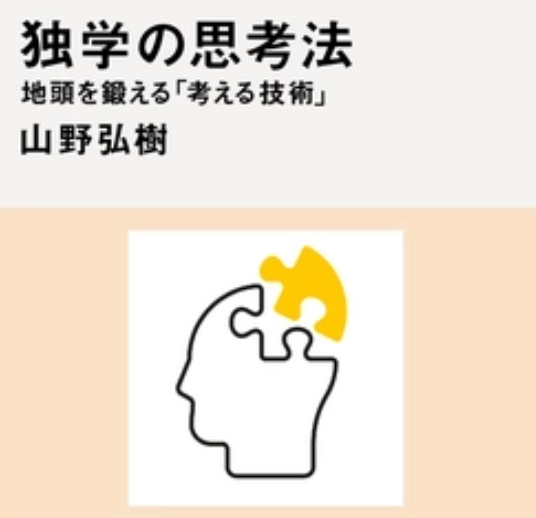
アタマの良い人が実践の「議論に強くなる方法」とは
✍️記事要約
先行きが見えない「答えのない時代」を生きる私たちにとって、「自分の頭で考える力」は必須です。でも、何をどのように考えれば良いのか、どのように勉強すれば良いのか、具体的な方法がわからない人も多いでしょう。
気鋭の哲学者・山野弘樹氏が、自分の頭で考えて学びを深めるための方法=「独学の思考法」をわかりやすく解説します。
※本記事は山野弘樹『独学の思考法』(講談社現代新書)から抜粋・編集したものです。
◾️違和感を覚えたときには、否定文ではなく疑問文を
それでは、自分の意見とは異なる意見に直面した場合、私たちはまず開口一番にどのような言葉を返すべきなのでしょうか?
それは否定文ではなく、疑問文です。
繰り返しになりますが、自分とは違う意見を聞いたとき、私たちは「なぜそのように思うのか?」という感情をまず抱くと思います。そしてそのように感じたならば、私たちはその感情を言葉にして相手に伝えれば良いのです。
もちろん、「なぜそのように思うのか?」という荒削りの感情をそのまま相手に伝えてしまうことは推奨されません。なぜなら、そうした感情のままに発せられる疑問文は、えてして懐疑的な調子で語られることが多いからです(文章では伝えづらいのですが、例えば「本当にそれが正しいと思っているのですか」といったような調子です)。
こうした問い方では、問いの内実としても、問いの発話としても不適切であるでしょう。
では、開口一番の否定文に取って代わられるべき疑問文とは、具体的にどのようなものでしょうか?ここで参考になるのが、本書の第1章「問いを立てる力」において紹介した問いのパターンです。
とりわけ、対話的思考において効果的なのは「判断の具体性を探究する問い」でしょう。なぜならこの問いは、対面の相手の「判断の具体性」を直接聞くことができるので、相手の主張の舞台裏を理解するのに最適だからです。
その3つの問いは次のようなものでした。
1.「それは、例えばどのような事態を想定しているのか?」[事例の具体性]
2.「○○という言葉で、何を意味しているのか?」[定義の具体性]
3.「何がきっかけで、そのように考えるようになったのか?」[根拠の具体性]
対話の場面において相手の主張に違和感を覚えたときは、まずこの3つの具体性を相手に問うことをお勧めします。
◾️ 「判断の具体性」をめぐる問いを応用する
1つ目の問いは、「事例の具体性」を問う問いです。
第5章の冒頭においても言及しましたが、言葉とは本来抽象的なものです。どれだけ具体的に語ろうとしても、言葉による説明には常に曖昧なところが残ってしまいます。
特に口頭での会話の場面において、ある主題について語り尽くすことはできません。言葉のキャッチボールを行う際に、1人がずっと喋り続けてしまうのはディスコミュニケーションの典型例でしょう。それゆえ、ある程度簡略化した仕方で自分の主張を相手に伝える必要があります。
そして、口頭での会話のキャッチボールを可能にするこの簡略化こそが、お互いに誤解の種を生んでしまうことが多々あるのです。こういうときに、相手が念頭に置いている事例を具体化することは、相互理解を促進するために大変有効な手段です。
具体的な事例として、「ゲームは教育に良くない」という主張を行う人物がいると想定してみましょう。
この主張に賛成や反対の意見を唱える前に、一度「例えばどのような事態を想定しているのでしょうか?」と相手に問いかけてみて欲しいのです。
ある言葉から受け取るイメージが各人においてバラバラであると、実は対話がすれ違っているのに、表面上、対話が成立しているかのように見えてしまうこともあるのです。
例えば「ゲームは教育に良くない」と主張する人は、「子どもがゲームをずっとやっているせいで、宿題をやらない」とか、「暴力的な描写や性的な描写があるゲームをやると、子どもの成長に悪影響を及ぼす」といった事例を想定しているかもしれません。
このように、相手が念頭に置いている事例を確認することで、「前者の事例には必ずしも同意できないが、後者の事例には同意できる」といった応答を行うことが可能になるのです(これは全面的な賛成でも全面的な反対でもありません)。
実際、「ゲームが原因で子どもが宿題をやらない」という認識は、「学校が出す宿題自体に何かしらの問題がある」という可能性を覆い隠してしまうことがあるのです(「どれだけ工夫のされていない宿題でもやれ」という命令は無理のあるものです)。
ですが、「ゲームを通じて暴力的かつ性的な体験をしてしまうと、子どもの精神的な発育にとって良くない」という論点は賛成できるものでしょう(もちろん、こうした論点はゲームだけではなく、漫画や映画やアニメーションにも当てはまるものではありますが)。
私たちは、相手の想定している事例を確認することで、「どの部分は納得できて、どの部分には議論の余地があるのか」という点について細かく対話をすることができるのです。
2つ目の問いは、「定義の具体性」(「○○という言葉で、何を意味しているのか?」)を問う問いです。引き続き先ほどの「ゲームは教育に良くない」という文章を例に挙げましょう。
このとき、2つ目の問いを対話の場面で活用すると、「『ゲーム』という言葉は、例えばどのようなものを意味していますか?」という問いを相手に発することができます。
実際、「ゲーム」という言葉は多義的なものです。例えば『スーパーマリオ』や『ゼルダの伝説』など、多くの人が念頭に置く「ゲーム」は「ビデオゲーム」として分類されるものです。
しかし、「ゲーム」という概念の中には、チェスや将棋などの「アナログゲーム」も含まれています。このとき、「ゲームは教育に良くない」と主張する人も、「アナログゲーム自体はむしろ教育に良いかもしれない」と意見を修正するかもしれません。
そして、さらに昨今は、古今東西の「アナログゲーム」を集めた『世界のアソビ大全51』というビデオゲームすら販売されています。その場合、アナログゲームの教育的効用を認めるならば、『世界のアソビ大全51』のようなビデオゲームの教育的効用も認められるのではないでしょうか?
……ここではこれ以上議論を続けませんが、「ゲームは教育に良くない」という主張一つから、ここまで精緻な意見交換を行うことができるのです。こうした対話は、開口一番に相手を否定してしまっては成り立ち得なかったものであると言えるでしょう。
3つ目の問いは、「根拠の具体性」を問う問い(「何がきっかけで、そのように考えるようになったのか?」)です。
私たちはこれまでの経験の積み重ねに応じた判断を下す生き物ですから、ある判断のパターンを形成してしまうような来歴をそれぞれ持っているのです。
そして、率直にそうした「きっかけ」を相手に聞くことは、相互理解を促進する上で大変有効な手段であるでしょう。
なぜならそれによって、「確かに、自分も同じ状況に置かれたら、同じように考えたかもしれない」という可能性に気がつくことができるからです。
私たちは多くの場合、「精神の傾向性が全く異質だから考え方が違う」というより、「これまで積み重ねてきた経験や当人が巻き込まれてきた社会的状況が異質だから考え方が違う」のです。
再び先ほどの例を挙げますが、「ゲームは教育に良くない」と述べる人が、実はビデオゲームを物凄くやり込んでいた人である可能性があります。どのようなビデオゲームであれ、記憶力や、戦術を立てる思考力や、ある種の指の器用さを向上させる可能性は大いにあります。
ですがビデオゲームだけをプレイし続けてしまうと、確かに教育的効用としては偏ったものになってしまうでしょう。そうしたことを実際に体験してきたプレイヤーであるからこそ、「総合的に見て、ゲームだけでは教育に良くない」という主張を行っている可能性があるのです。
こうした判断の舞台裏を見ると、「確かにその主張も一理あるかもしれない」ということを認めることができるのです。
このとき、質問者自身も、「私はビデオゲームにも教育的効用があると感じています。例えば昔……」という風に、自らの経験を相手に伝えると良いでしょう。すると相手も、「なるほど、そういう経験をしたら、確かにそのように思うかもしれない」という風に納得してくれる可能性も出てきます。
このようにお互いの判断の経験的根拠を共有することで、様々な角度からビデオゲームにまつわる対話を行うことができるのです。
さらに連載記事<アタマの良い人が実践している、意外と知られてない「思考力を高める方法」>では、地頭を鍛える方法について解説しています。ぜひご覧ください。
■英訳
Living in an “Era Without Answers”: The Need for Independent Thinking
In today’s uncertain world, where the future is unclear and answers are often elusive, the ability to think independently is essential. However, many people struggle to understand how to think critically or how to study effectively.
Prominent philosopher Hiroki Yamano offers clear and practical explanations for cultivating independent thinking and deepening personal learning—what he calls the method of self-study thinking.
This article is an excerpt and adaptation from Hiroki Yamano’s book, “The Method of Self-Study Thinking” (Kodansha Modern New Library).
When You Sense Discomfort: Use Questions Instead of Statements
When faced with opinions different from your own, what should your initial response be?
It should not be a statement of disagreement but a question.
When we hear an opinion contrary to ours, our instinctive reaction is often to wonder, “Why do they think that way?” If this feeling arises, the best course of action is to put it into words and share it with the other person.
However, it’s not ideal to express raw emotions like “Why do you think that way?” directly. Questions framed in such an unrefined manner often come across as skeptical or accusatory (e.g., “Do you really think that’s correct?”), which is both inappropriate in tone and content.
So, what kinds of questions should replace initial statements of denial? A useful approach is the set of question patterns introduced in the first chapter of Yamano’s book, focusing on “exploring the specificity of judgments.”
These three types of questions are particularly effective for fostering dialogue:
1. “What kind of situations are you envisioning, specifically?” [Specificity of Examples]
2. “What do you mean by the term ___?” [Specificity of Definitions]
3. “What made you start thinking that way?” [Specificity of Reasons]
If you feel discomfort or doubt during a conversation, start by asking the other person these three questions to promote mutual understanding.
Applying Questions About “Judgment Specificity”
1. Questions About the Specificity of Examples
As mentioned earlier, words are inherently abstract, and even the most detailed explanations can leave room for ambiguity. In verbal conversations, this ambiguity often leads to misunderstandings, especially since speakers must simplify their arguments to keep the conversation flowing.
This simplification, however, can sow the seeds of miscommunication. When you’re uncertain about someone’s claim, asking them to provide specific examples is a highly effective way to promote understanding.
For instance, imagine someone asserts, “Video games are bad for education.” Before agreeing or disagreeing, try asking, “What kind of situations are you envisioning, specifically?”
People often have different images associated with the same words, which can create the illusion of agreement or disagreement where none truly exists. For example, the person making the claim might be thinking of situations like:
• Children neglecting homework because they spend all their time playing video games.
• Exposure to violent or sexually explicit content in games harming children’s development.
By clarifying these examples, you can respond more precisely, such as: “I don’t entirely agree with the first example, but I can understand the concern in the second one.” This allows for a nuanced discussion instead of blanket agreement or disagreement.
Moreover, identifying specific scenarios can reveal overlooked perspectives. For instance, the argument that “video games cause children to neglect homework” might mask deeper issues, such as flaws in the design or purpose of homework itself.
2. Questions About the Specificity of Definitions
The second type of question seeks to clarify the definition of terms. For example, in response to the statement “Video games are bad for education,” you might ask, “What do you mean by ‘video games’ in this context?”
The term “video games” can encompass a wide range of activities, from digital games like Super Mario and The Legend of Zelda to traditional analog games like chess and shogi. A deeper discussion might reveal that the person making the claim considers analog games beneficial for education while criticizing only certain types of digital games.
This kind of questioning can lead to more precise and meaningful discussions, allowing both sides to refine their positions and identify common ground.
3. Questions About the Specificity of Reasons
The third question probes the reasoning behind a person’s judgment: “What made you start thinking that way?”
Our judgments are shaped by accumulated experiences, and understanding these origins can foster empathy and mutual respect. For instance, someone who believes “video games are bad for education” might have formed this opinion based on personal experiences, such as overindulgence in gaming leading to negative outcomes in their own life.
By understanding the reasoning behind such claims, you might find points of agreement or shared experiences that lead to more productive conversations.
Enhancing Dialogue Through Mutual Understanding
By focusing on the specificity of examples, definitions, and reasons, we can transform disagreements into opportunities for deeper understanding. Asking thoughtful questions instead of making hasty judgments helps foster meaningful dialogue and mutual respect.
For more insights on improving critical thinking, check out the series “Lesser-Known Methods Smart People Use to Sharpen Their Minds.”
◇ ◇ ◇
